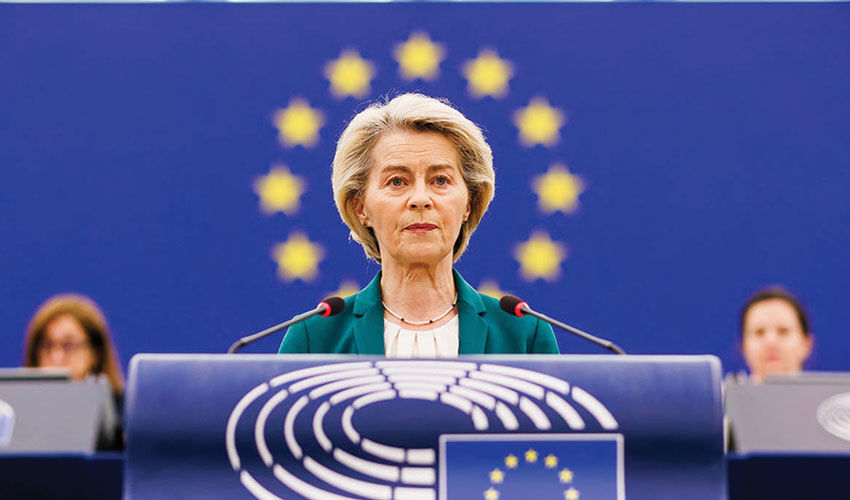
The stakes are incredibly high. Europe is negotiating a potential trade agreement with the U.S. administration, and it is struggling to maintain influence over peace talks between Ukraine and Russia. That’s why the outcome of the vote could determine the EU’s strategic course. And it could finally force von der Leyen to make a decisive choice: govern from the political center or continue a process that some Europeans have called a drift toward right-wing nationalism. The choice von der Leyen makes could profoundly affect the EU’s global position and credibility.
The vote of no confidence was an initiative of extreme right-wing and far-right factions, and was triggered by a recent court ruling against von der Leyen for her refusal to release text messages she exchanged with Pfizer CEO Albert Burla during negotiations over the Covid-19 vaccine. However, the vote is also due to broader concerns about her alleged actions in circumventing the EU Parliament, as well as the centralization of power in the European Commission.
The vote has little chance of approval, but it cannot be dismissed as idle chatter or, in von der Leyen’s words, as “another crude attempt to drive a wedge between our institutions, between the pro-European, pro-democratic forces in this parliament.” The irony is that the far right’s attempt to oust von der Leyen has helped the leading parties voice their own dissatisfaction with her increased willingness to support the ideas of the far right.
Three centrist parties played a key role in von der Leyen’s confirmation for a second term at the head of the European Commission – the Progressive Alliance of Socialists and Democrats, Renewing Europe (formerly ALDE) and the Greens – European Free Alliance. But they now have growing frustration because of what they see as her abandonment of shared policy priorities. Although she promised to govern from the political center and these parties, her European People’s Party (EPP) is increasingly dependent on support from the right.
This strategic shift has led the EPP to weaken its European Green Deal program, relaxing corporate sustainability reporting requirements and postponing an EU law against deforestation. The party has also reportedly recently sought support from the far right to secure the appointment of key rapporteurs for two immigration laws that could seriously tighten the bloc’s migration policy.
The changes have made von der Leyen politically vulnerable. The European Commission president, squeezed between two irreconcilable parliamentary blocs, jeopardizes the EU’s ability to pursue a coherent policy.
Since its creation in 1958, the European Parliament has been empowered to pass a vote of no confidence. It is a key instrument of democratic control. Once appointed, the European Commission is collectively responsible to the Parliament. If trust is lost, the Parliament can exercise its right to punish it.
But all 13 votes of no confidence that have been brought before the European Parliament since its creation have either been withdrawn or failed. This is partly because of the deliberately high threshold: you need a two-thirds vote, or at least 361 MEPs. The threshold is even higher than for electing the President of the European Commission.
The serious consequences of forcing the resignation of the entire Commission have traditionally prevented the leading parties from endorsing such initiatives. In a more fundamental sense, MEPs have long been guided by a sense of institutional loyalty: European unity, rather than democratic accountability, is often the priority.
But its limited use does not diminish the political importance of this mechanism. In parliamentary democracies around the world, opposition parties routinely bring a vote of no confidence to win concessions from ruling coalitions. While the EU version is more complex, the basic dynamic is the same: opposition forces can gain leverage even if success is elusive.
This has happened before. In 1996, parliament set up a committee to investigate the mad cow disease crisis. The ensuing vote of no confidence was rejected, but it paved the way for the emergence of the “conditional no confidence” mechanism: lawmakers gave the European Commission six months to address specific problems. The threat of future action was used to get concrete political commitments.
Today, Europe’s leading parties are in a surprisingly strong position to exert such pressure. Without their continued support, von der Leyen will not be able to tackle a number of political priorities: budget negotiations on the “Multiannual Financial Framework,” implementation of the EU competitiveness program, adoption of the common market reform package, and work on the European rearmament initiative, which requires an unprecedented level of budgetary coordination.
The Social Democrats, Liberals and Greens in the European Parliament can seize the moment and demand clear commitments in return for continued support. More importantly, they must force von der Leyen to choose between two irreconcilable policies: governing with the centrist coalition that has defined EU policy for the past fifty years, or continuing to flirt with nationalist parties that make explicitly non-centrist policy demands.
Democratic institutions around the world are under pressure, so demonstrating Europe’s ability to self-correct is important far beyond its borders. The question is not whether Parliament will fire von der Leyen (no, it won’t), but whether it will seize the chance to define the conditions for responsible governance in Europe.
Alberto Alemanno,
professor of EU law at the Ecole Supérieure de Commerce de Paris (HEC Paris),
visiting professor at the College of Europe in Bruges and Natolin, founder of the organization “The Good Lobby”,
author ofLobbying for Change: Finding Your Voice to Create a Better Society(Icon Books, 2017).
© Project Syndicate, 2025.
www.project-syndicate.org






